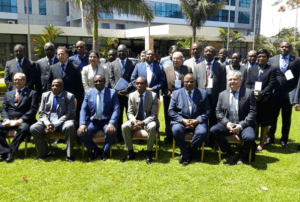African Court outlines legal jurisdiction
 The African Court on Human and Peoples’ Rights, has affirmed its jurisdiction to deal with all cases and disputes submitted to it concerning interpretation and application of the African Charter.
The African Court on Human and Peoples’ Rights, has affirmed its jurisdiction to deal with all cases and disputes submitted to it concerning interpretation and application of the African Charter.
The jurisdiction covers, the Protocol and any other relevant human rights instrument ratified by the States concerned and also has the power to render an advisory opinion on any legal matter relating to the Charter or any other relevant human rights instruments, provided that the subject of the opinion is not related to a matter being examined by the Commission.
African Court re-affirmed its original jurisdiction at the international symposium to mark a decade of human rights protection on the continent currently underway in Arusha, the United Republic of Tanzania.
Justice Sylvain Oré President of the African Court noted that the continental legal body also seeks to promote amicable settlement in cases pending before it in accordance with the provisions of the Charter; and to interpret a judgment it had rendered.
The African Court also has jurisdiction to review its own judgment in light of new evidence in conformity with its rules.
Justice Ore explained that the procedure before the African Court shall consist of written, and if necessary, oral proceedings.
“The written procedure shall consist of the communication to the African Court, the parties, as well as the African Commission, as appropriate, of applications, statements of the case, defences and observations and of replies if any, as well as all papers and documents in support, or of certified copies thereof.
“The oral proceedings shall consist of a hearing by the African Court of representatives of parties, witnesses, experts, or such other persons as the Court may decide to hear,” he said.
He said every party to a case shall be entitled to be represented or to be assisted by legal counsel and/or by any other person of the party’s choice.
On Cooperation of the States; Justice Ore explained that the States Parties to a case have the obligation to cooperate so as to ensure that all notices, communications or summonses addressed to persons residing in their territory or falling under their jurisdiction are duly executed.
“The same rule shall apply to any proceeding that the African Court decides to conduct or order in the territory of a State Party to a case.
“When the performance of any of the measures referred to in the preceding paragraphs requires the cooperation of any other State, the African Court President shall request the government concerned to provide the requisite assistance,” he said.
About 150 delegates including the academia, civil society organisations, Organs of the African Union, judiciary representatives of regional and sub-regional human rights institutions, media practitioners are attending the two day commemoration.
Themes being discussed include: The historical genesis of the Court; The jurisdiction of the Court, similarities and peculiarities in comparison to other regional and sub-regional bodies; Challenges to judicial protection to human rights in Africa and ; Enhancing institutional legitimacy and protection of human rights—a persistent challenge of emerging human rights institutions: The case of the African Court.
Other issues are Accessibility of the Court—economic, legal and other obstacles; a critical analysis of jurisprudence of the African Court; Ten years of African Court—lessons learnt and; Institutional co-operation between the African Court and the African Commission on Human and Peoples’ Rights.
The German International Development Agency has facilitated the two-day Symposium in collaboration with the African Court.
Source: GNA
